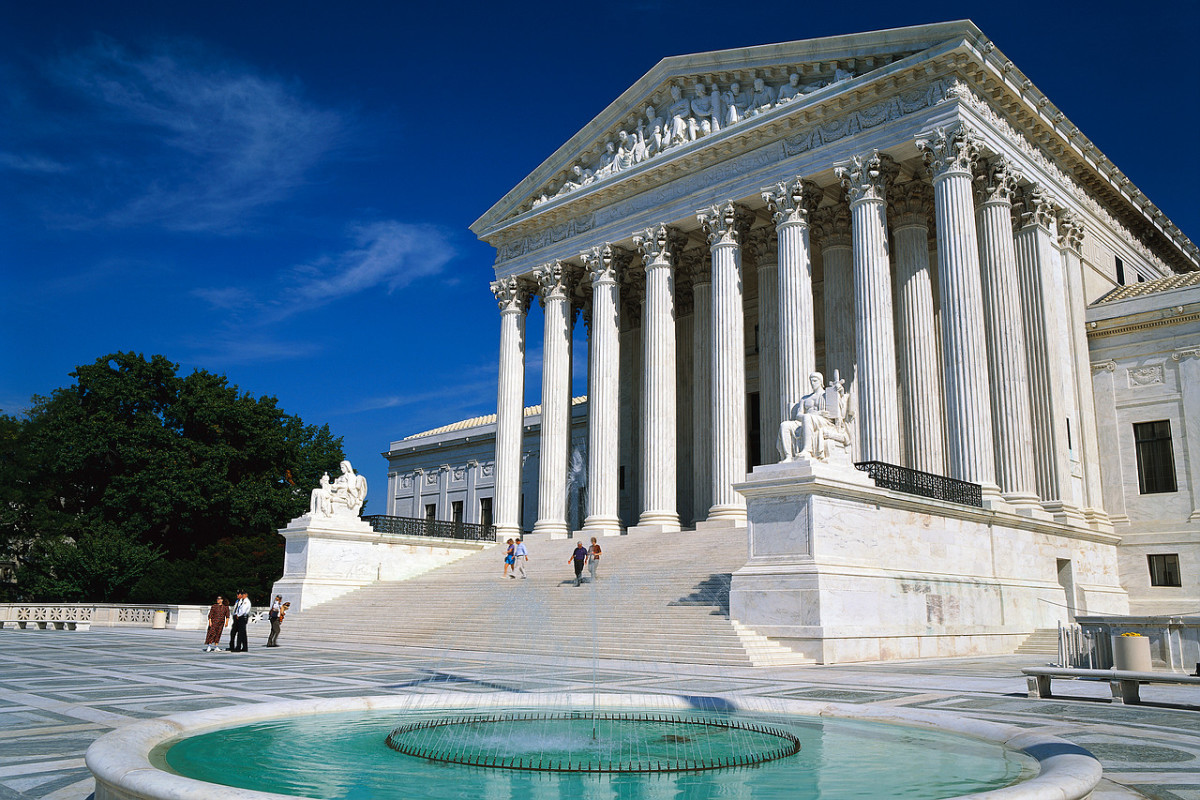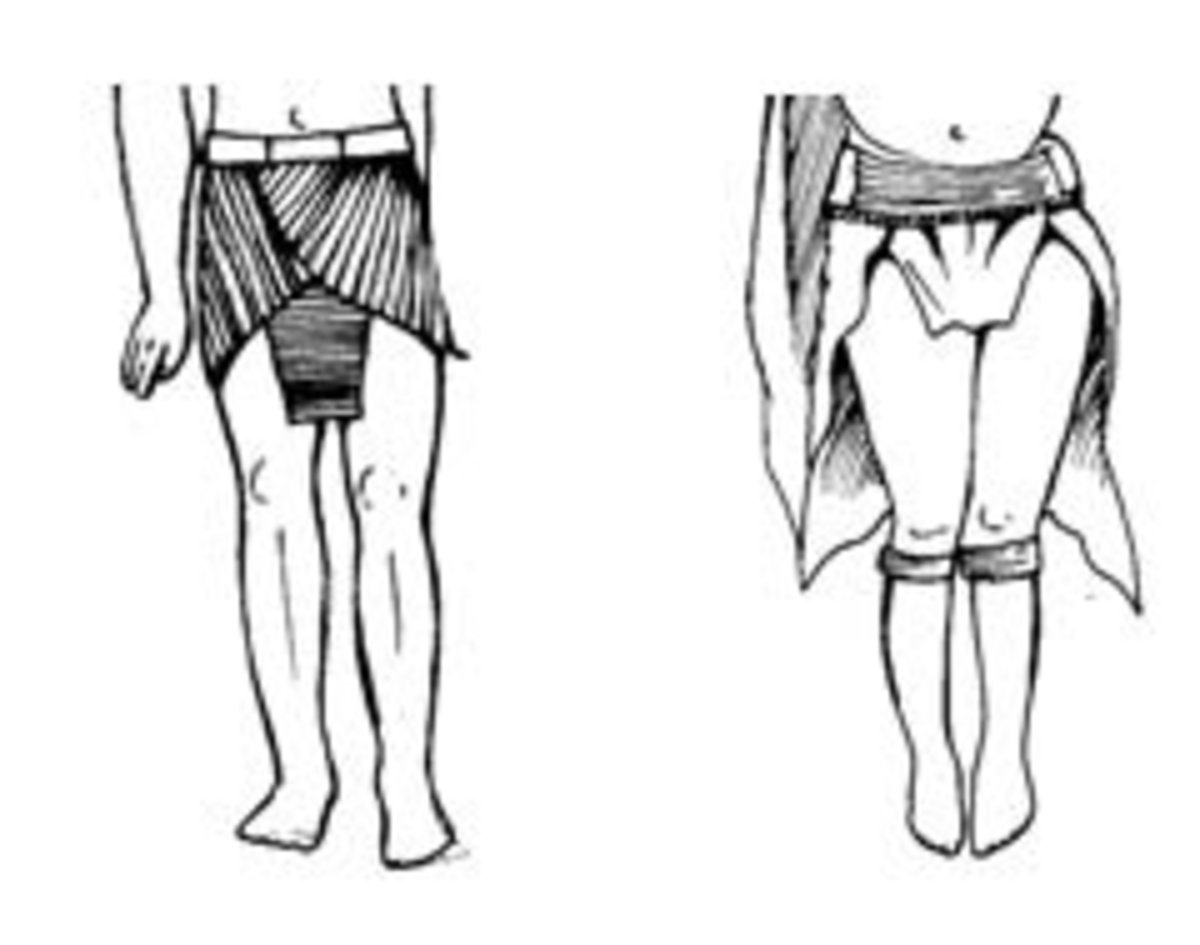The "Hobby Lobby Supreme Court Decision" Explained In Plain English
Burwell vs Hobby Lobby
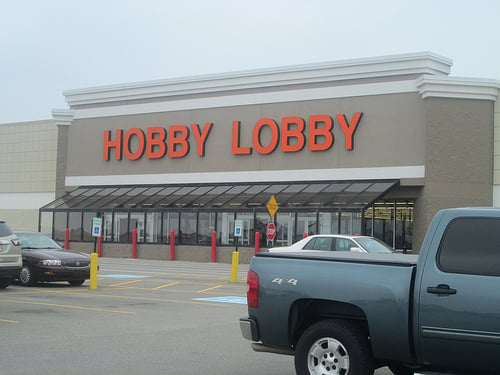
Affordable Care Act (Obamacare)
Along with consulting laypeople in Congress, President Obama, in perfecting the language of his Affordable Care Act, passed the buck to the professionals at the Department of Health & Human Services (HHS). He gave them free reign, letting them decide what type of preventative care that employer based health plans should offer to women.
At the time, Kathleen Sebelius was Secretary of HHS so she had some input. That is why she was named on the original lawsuits contesting Obama's new healthcare law. When she resigned on April 10, 2014, Sylvia Mathews Burwell became the new Secretary of HHS and that is why you see her name on all the lawsuits - Burwell v Hobby Lobby.
Part of the Department of Health and Human Services is the HRSA - Health Resources and Services Administration. This agency has several functions but in this case, its function was to specify what kinds of preventative care should be covered in certain employer-based health plans.
It was the HRSA who decided that all 20 of the FDA approved contraceptives and devices should be covered on ALL employee health plans. Companies who refused to cover women with all 20 forms of contraception would be subject to a fine of $100 per day - per employee.
They did allow that companies could, as an alternative, replace the employee's health care with higher wages so the employee could seek health care elsewhere at their own expense.
HRSA took it a step further, obviously with President Obama's blessing, to make religious employers exempt which included churches, religious orders and any associations within churches.
Perhaps if HRSA had never added this part, there would have been no case before the Supreme Court with Hobby Lobby.
Looking at it from the other side, if HRSA had never added the coverage part, women wouldn't have had access to multiple birth control choices via employer based health care plans.
A double-edged sword, to be sure.
The Final Wording Of The Affordable Care Act
The Affordable Care Act was signed into law on March 23, 2010 by President Obama which requires all employers to provide health insurance to their employees which includes essential health benefits and free preventative care and screenings.
In regard to female employees, the Act requires companies to provide them with no-cost access to 20 FDA approved forms of birth control.
An exemption was given to employers with less than 50 employees, as well as for churches, religious hospitals, schools and non-profit organizations.
However, the "for-profit" companies were required to comply with the terms of the Affordable Care Act or else pay fines of $100 per day, per employee until they came into compliance.
The Affordable Care Act seems to encroach on a few other laws, not to mention certain civil rights which is at the crux of this lawsuit.
If you want to learn more about the Affordable Care Act in its entirety, you can read it here. But for the intent of this article, the stated portions are all we need.
This lawsuit is not really complicated and although it took a year to get on the Supreme Court's docket, from presentation of arguments to final ruling only took two months.
Piece of cake, right? lol
Religious Freedom Restoration Act of 1993 (RFRA)
This act was signed by President Clinton in November 1993. It prohibits government from substantially burdening a person's exercise of religion even if the burden results from a rule which is required of everyone.
Questions Before The Supreme Court
1. Can the law require a family-owned business to provide health insurance for their female employees that includes certain birth control benefits and methods which they believe violates their religious beliefs?
2. Why do certain religious organizations get exemptions from The Affordable Care Act and not family-owned Christian centered businesses?
The point of filing this lawsuit was because Hobby Lobby's owners (the Green family) wanted an Obamacare exemption from having to provide and pay for certain birth control benefits, for example, the morning-after pill which the Green family believes brings about abortion.
This case was not to question their religious beliefs, nor the truth of the information on which it was based.
By requiring a family-owned company to provide and pay for the 20 FDA approved contraception benefits, four of which are against their religious beliefs and are pictured in the sidebar, the Green family asserts that the Affordable Care Act has violated their First Amendment rights and their rights under the 1993 Religious Freedom Restoration Act in one fell swoop.
This is the biggest lawsuit against the US Government questioning the government's intrusion into the lives of businesses run by "real people." (emphasis mine)
It's All In The Wording!
The success or failure of any lawsuit can turn on a dime if its wording is questionable, vague or if it could be taken in two (or more) ways.
To "PLAINLY say what you mean" is difficult in a litigation world where the legal language is anything but clear.
In my world, plain language works best which is what I try to use in most of my articles. In sections where I have cited "legalese," there are usually linked sources or sidebar explanations.
It is my hope that you will find this article understandable so that you come away with at least conversational knowledge of the precedent setting case.
The "Humanizing" Of Hobby Lobby
Because Hobby Lobby was viewed a "company" and not a "real person," the smartest thing the Green family did before getting to the Supreme Court level was to successfully petition a lower court to qualify and refer to the family-owned Hobby Lobby Company - as a "real person."
After winning that point, the wording in all the legal documents was now more user-friendly.
Hobby Lobby had a face ... the Green family.
It was far easier and believable to present this case from the standpoint of a "family of real people with the same religious beliefs who also operate a business,"
as opposed to
"a 21,000 employee Christian-centered company who have strong religious beliefs."
Oh, how easily prosecutors could have twisted up the wording of this case!
Narrowing it down to precise wording brought about the desired result and in the process managed to cut out the slew of arguments and possible future lawsuits that would have:
- challenged if every one of the company's 21,000 employees had the same religious beliefs,
- challenging the basis of their religious beliefs,
- argued the meaning of when "life" begins in the womb and
- argued what one believes is the function of certain birth control methods (whether or not it aids abortion, i.e. morning after pill, etc).
That may not seem like much of a big deal when you read it the way I wrote it, but seeing the Supreme Court ruling now, it allowed Hobby Lobby to go forth to present their argument that the Obamacare regulations were forcing the company to obey a law that went against their religious beliefs, thereby infringing on their First Amendment rights.
Highlights of the Parts of the First Amendment Affecting This Case
The First Amendment protects the right to freedom of religion and freedom of expression from government interference.
Two clauses in the First Amendment guarantee freedom of religion.
The Establishment Clause prohibits the government:
- from making any law “respecting an establishment of religion.”
- from passing legislation to establish an official religion or preferring one religion over another.
- from unduly preferring religion over non-religion, or non-religion over religion.
The Free Exercise Clause prohibits the government, in most instances, from interfering with a person's practice of their religion.
Conestoga Wood Specialties
This is a for-profit Lancaster County, PA based furniture company of about 1200 employees, and is owned by the Hahn family, who are Mennonites.
In their appeal to the Court of Appeals of the Third Circuit, they claimed that it would be "sinful and immoral for them to pay for insurance that covers contraception for their female employees" under the Affordable Care Act.
The Third Circuit ruled against them and they appealed to the U S Supreme Court.
Mardel, Inc.
Based in Oklahoma, Mardel Inc is a closely-held for profit chain of 32 Christian educational stores in six US states. It is part of the Hobby Lobby group of companies, owned by Mart Green whose is the son of Hobby Lobby owners, David and Barbara Green.
Along with his father David Green, Mart Green and his wife rescued Oral Roberts University in 2007 by donating $70 million to wipe out their debt. Mart and his wife have donated a total of $110 million to the university to perform extensive renovations and technology improvements. Mart Green sits on their Board of Trustees since 2007.
Conestoga Wood Specialties and Mardel, Inc. filed a lawsuit against the Affordable Care Act in the Supreme Court citing violation of their First Amendment rights.
When Hobby Lobby filed with the same grounds in their lawsuit, Conestoga and Mardel merged with Hobby Lobby to sue the US government.
Hobby Lobby
This is a closely held for-profit Oklahoma City, OK based company, owned and operated by Pentecostal Christian billionaires David and Barbara Green, and their three children.
The words "closely held" must be defined in order to go forward.
A "closely held" corporation is one where more than half of the stock is owned (directly or indirectly) by five or fewer individuals, usually family members and/or close associates. The stock doesn't have to be publicly traded to be considered "closely held."
The three companies in this lawsuit - Hobby Lobby, Conestoga Wood Specialties. and Mardel - all are either controlled by or owned by a single family.
The Family Background And Beliefs Are Key To This Case
Their son, Steve Green is president of Hobby Lobby. Their daughter, Darsee Lett is creative director for the Hobby Lobby stores. Their son, Mart Green is founder and CEO of Mardel Christian and Educational Supply Inc, also in Oklahoma and a partner in this lawsuit.
David Green is the son of an Assembly of God pastor and the Greens' extended family members are devout Assembly of God church members and pastors.
David Green takes half of Hobby Lobby's total pretax earnings and donates to a list of evangelical ministries which includes $10.5 million in 2004 to Jerry Falwell's Liberty University and helping his son Mart Green with $70 million to bail out Oral Roberts University in 2007. To date the family has donated at least $500 million to Christian based causes in the US, Africa and Asia.
The Green family has strict Christian beliefs that life begins at conception and they object to ending a life. They believe that two versions of the "morning after" pill and two kinds of IUD's are abortifacients, which end pregnancies by aborting them as opposed to preventing them.
Based on the fact that the law violates their religious beliefs, Hobby Lobby is suing the US government for a permanent exemption from the Affordable Care Act particularly the part which requires them to provide their female employees with access to 4 of the 20 FDA approved forms of birth control (pictured in the sidebar).
This lawsuit also claims the Affordable Care Act infringes on their right to freely practice their religion and they object to being forced to pay a fine if they don't follow the law.
Hobby Lobby's 4 Contraception Objections
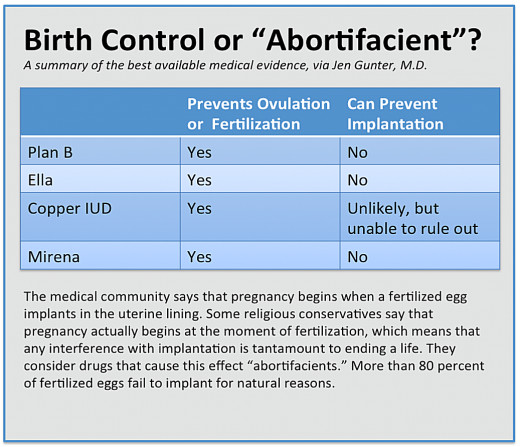
Hobby Lobby's Position - Video from October 2012 - while case was still in Appeals Court
The US Government Policy on Emergency Contraception
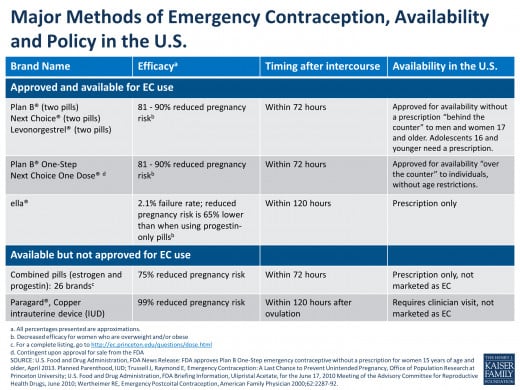
The 4 Forms In Question

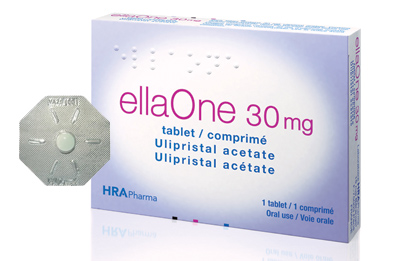
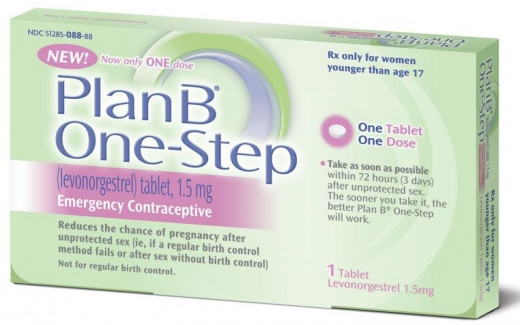
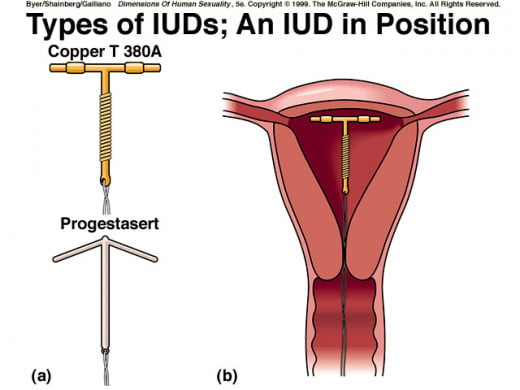
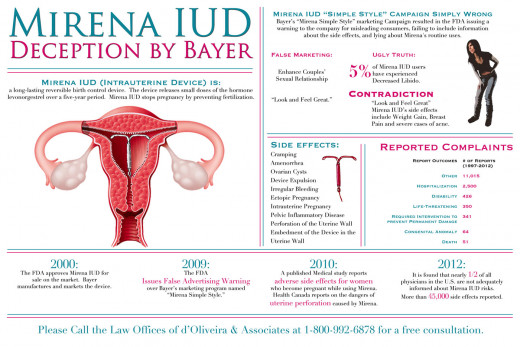
The Types of Contraception At Issue
All of the US government's lawyers spent considerable time arguing about the functions of the four kinds of contraception on Hobby Lobby's list. There were experts testifying that they were not abortifacients.
But when I read Justice Samuel Alito's 35 page opinion (which you can read here), the religious objection part of this case was not about whether those four kinds of birth control actually functioned as the Green family stated.
Instead, it was about what the Green family "believed" was the function of the four types of birth control, because their religious beliefs are based on what they believe the function of the methods and devices to be.
Here's a short description of each form, which are pictured in the sidebar:
Plan B is one form of the morning-after pill and when taken during a specific 48 hour period in the cycle, it works by stopping the release of the egg from the ovary and prevents the sperm from meeting the egg. If fertilization does happen, Plan B can also prevent the egg from attaching to the womb.
Ella is another form of the morning-after pill which also works by stopping ovulation, except it is said to be better than Plan B. The 30 milligram medication is said to have no ill effect on sperm, the fertilized egg or the uterine lining. However, higher doses do, so the egg cannot implant.
ParaGard is a copper IUD which damages the sperm and egg, blocks the route for the sperm to the egg and helps prevent implantation for pregnancy.
Mirena is an IUD which changes cervical mucus, thins the lining of the uterus and blocks implantation of the egg.
The Final Supreme Court Ruling
On June 30, 2014, the Supreme Court ruled 5 votes to 4, that "closely held" stock corporations can choose to be exempt from the law based on religious preferences.
Hobby Lobby, Conestoga and Mardel won their case.
CNN Explains The Ruling
6/30/2014 - After The Win: Interview With Hobby Lobby's Attorney
Your Understanding Of This Case
How well did this article help you to understand the facts of the Hobby Lobby case?
What Do You Think?
Your comments are just as important as everyone else's, so don't be shy.
It doesn't matter if your views are pro or con. All comments are welcomed.
Thank you.
© 2014 Rachael O'Halloran


